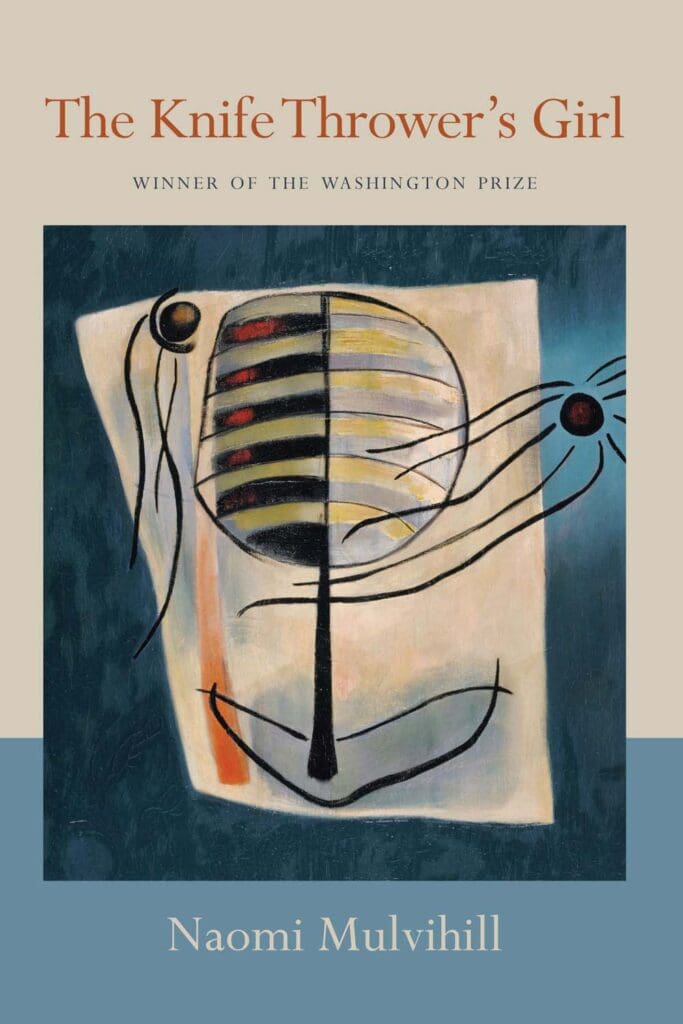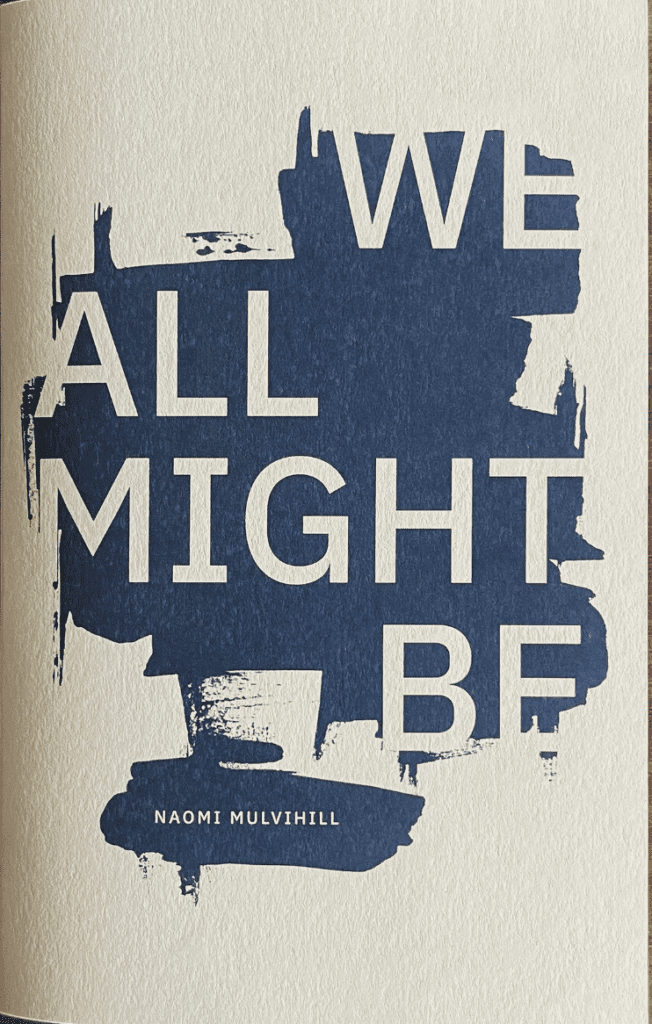Poetry alum Naomi Mulvihill chats with us about how her Lesley MFA mentors helped her learn not to hide what she didn’t know, exploring topics around education and craft, teaching poetry to young writers, and making time and space for writing.
NAOMI MULVIHILL – POETRY, 2011

NAOMI MULVIHILL was a Margaret Murphy endowed fellow at the Fine Arts Work Center in Provincetown, MA. Her chapbook, We All Might Be, the 2022 Tomaž Šalamun Prize Editor’s Choice Selection, is available from Factory Hollow Press. Her first full length volume of poems, The Knife Thrower’s Girl, was awarded the 2022 Washington Prize and is forthcoming from The Word Works. Her poems have been published in the Kenyon Review Online, Michigan Quarterly Review, New Orleans Review, Salamander, Cimarron, West Branch and others, and featured in Verse Daily. Naomi’s essays on language and learning have appeared in The Writer’s Chronicle and Harvard Educational Review. She is a veteran bilingual teacher in the Boston Public Schools. Naomi’s latest book of poetry, The Knife Thrower’s Girl has been awarded The Washington Prize for Poetry.

Interview By
Rex Arrasmith
What memories would you like to share about your time at Lesley?
I vividly remember being in a seminar Wayne Brown was giving on meter. This was one of the first days of my first residency. Wayne had each of us stand at the whiteboard and scan stanzas of poems. I knew there was such a thing as iambic pentameter and something called a trochee and a spondee, maybe—but barely. And, basically, I couldn’t hear the stresses. It was a brilliant moment of not being able to hide my ignorance that opened out into a feeling of not wanting to hide what I didn’t know and hadn’t yet learned. Sadly, the world lost Wayne to cancer before I graduated and before I was able to articulate the significance of that LEARN-DON’T-HIDE lesson to him.
I also remember being in a seminar with A.J. Verdelle. If you know A.J., then you know she enacts with humor and generosity the idea that nothing should be wasted (not an utterance, not a moment) in an MFA seminar. For someone like me who was hardly able to get words out of my body and onto the page, the whole idea of editing could have felt like a separate and unsurmountable task. A.J. made it an organic process of the poem’s differentiation (systematic but organic) rather than an alienating objectification of the poem. I am so grateful to her for that.
What have you done to keep yourself writing now that the deadlines and assignments have stopped?
I work as an elementary teacher, so a great deal of my time and energy goes into thinking about and facilitating young children’s learning. I have to eke out writing time. I have to write when I am tired. We all do. Luckily, for me, writing feels fundamentally physical—as visceral as sweating or blinking and as mysterious and ordinary. If I deny myself time for writing, I get into trouble. It’s a predicament both simple and fraught.
One poem can take me years to write. I usually work on several things at once. I keep a journal. I know that summer is an opportunity to work little heaps of fragments into poems. Sometimes I take remote classes offered through 24 Pearl St. at the Fine Arts Work Center where I was a fellow. That can create deadlines if I need to be hied along to get started on a poem or three or four. I look at a lot of art and read books (often 4 or 5) simultaneously. For example, right now I am reading a new translation of Clarice Lispector’s complete stories by Katrina Dodson, Van Gogh’s letters, Ai Weiwei’s memoir, Undoing Gender by Judith Butler and a bilingual anthology of five female Latin American poets edited by Nidia Hernández who is a friend of a friend. Depending on my level of fatigue and ability to focus, I pluck one from the stack. What I read can be pretty random—legal transcripts, old cookbooks—anything that interests me. I count reading as part of writing. The two are overlapping and reciprocal actions. One stimulates the other.
Is there any advice from your Lesley mentors that has stayed with you?
I had the amazing good fortune to work with Janet Sylvester, Cate Marvin and Spencer Reece as poetry mentors. Implicitly or explicitly, all gave me the same message: Keep writing! Make time and space for writing. Don’t let outside expectations guide your writing. Wait to submit your poems until you are ready.
In terms of prose, both Pablo Navarro (a meticulous scholar of the history of education as a tool of colonization) and Steven Cramer (the program director at that time) vigorously encouraged me to explore topics around education and craft, respectively, and publish essays. Their, “Why not you?” attitude made me think, “Well, why not?”

I know you work as an elementary school teacher. Is teaching your young students how to read and write poetry a part of your instruction?
Yes. I have always made reading/reciting and discussing a poem over the course of two weeks part of the morning routine. We revisit the same poem repeatedly until students have internalized it. During the second week, students write an original poem in response to the poem under study. They write and illustrate their poems in a poetry journal. By the year’s end, they have a collection of their own work alongside the work of the famous authors with whom they have entered into dialogue through poetry.
Does your work as a teacher influence your writing?
I generally keep the two separate. There are poets who have managed to write powerfully as teacher/educators or write about schools and how they serve students or fail to serve them. Here I am thinking about Eve Ewing’s Electric Arches and Alma Luz Villanueva’s poem “Crazy Courage,” to name two. As the crisis in education deepens in this country, it’s difficult to imagine that it won’t seep into my writing. I am so close to the daily crush—the grinding belittlement of children’s and teachers’ humanity—that it is difficult to get the distance that would allow me to find any nuance that could be the generative point for a poem. By nuance, I mean some intimate detail that a reader would feel at the deepest level rather than something more journalistic.
I know you are a bilingual teacher. Do you also write poetry in any other language?
I wish I did! Though routinely I write in Spanish for work, I don’t write poetry in Spanish. Reading in Spanish gives me so much pleasure and allows me access to writers without an intermediary. I am fascinated by translation, the untranslatable, missteps in translation, “flawed” speech, and the mental processes around being inhabited by/inhabiting another language. Speaking, reading and writing in a second or third language teaches you so much about language in general. It gives a heightened awareness of language (what’s happening on the surface as well as beneath it).
Congratulations on winning The Washington Prize for your first full length poetry collection, The Knife Thrower’s Girl. How long did it take you to put together? I’m also curious to hear about its genesis. Did you have a plan when you started out or did it come together organically as you wrote and edited the poems?
I didn’t really have any plan at all. I wanted to learn to write a poem. From the start, I tried to take Philip Levine’s advice (or maybe it was advice given to him by John Berryman) to write the poem I couldn’t write, didn’t know how to write, lacked the skills to write. Something along those lines. Over the course of more than a decade (though I’d be lying if I didn’t say that many fragments or seeds for poems in the volume were things I turned over in my mind for more than twenty years), I accumulated a raft of finished poems, some of them published in journals, others never sent out and still others that had been rejected. For a while I couldn’t feel the book they might materialize into. Then I guess there was a tipping point. Those poems, ordered and reordered, started to take the shape of a manuscript. I think I sent it out in 2020 and again in 2021. So, I suppose you could say, like almost everything I do, I was an active agent in the making of the book that also just happened. I am a bit rudderless. I don’t try to steer things too much. I let the poems lead me.
When writing a poem, do you have a reader in mind or are you writing primarily for yourself first?
There is always someone with me as I work. I can’t know them. I can’t see them. But the felt presence is there. I am in primary relation to that someone. I guess you could call it the consciousness of a reader. I feel responsible to them, but also affirmed by them because they plod along with me across years and unpredictable challenges. Of course, when the poem is written, that someone takes the shape of a reader who is complex, possessed of a specific identity, driven by needs and perhaps a sense of urgency that the poem is likely to fail or betray. Those feelings often overtake me when the poem is reaching its final form, or just after. It’s a kind of agony to put something out in the world hoping it will provoke feelings and ideas in a reader but fearing it might inadvertently do harm. I imagine every writer and artist of any kind must feel it.
In your recently published chapbook, ‘We All Might Be’ there is pathos, horror, and strength. Your use of metaphor dulls the pain and the rhythm in each poem felt like you were lessening each blow with a gentle breath. You have a unique way of using line breaks that breaks up sentences, forcing a rhythm. How do you decide where to break the line?
What I know about poetry resides in me somewhere other than on a plane of thought. So, I would wager that as a reader you probably have much better insight into what the poem is doing on the page than I myself have as I engage in its making. I listen and look and allow things to happen. I fool around with page breaks and stanza breaks quite a lot and generally go by what feels right on a corporeal level (ear/eye/heart/gut). I don’t do drafts of poems. They evolve, not through successive drafts, but by slowly coming into view. Some words and lines show up and stay. Some fall away. Some seem to linger for a while almost as red herrings to make me have to ask again and again what the poem wants. What gives me joy with regard to writing poetry is the not knowing.
I love to step into the unknown of a poem and divine a path through. Through? Into? Divine a path, I should say, that presents itself as possible. Obviously, there could have been any number of paths, but I have to write from wherever I am (my current stage of development) and whatever I know/feel (my present understanding) in the moment, as Carl Phillips says so wisely in My Trade is a Mystery, his new book of essays on writing. Also, I love that a poem talks back to me and through me and that I have to listen as if my life depended on it to find the poem’s way into the world.
Listen to Naomi read four of her poems against images designed by her sister Alexa:


Comments are closed